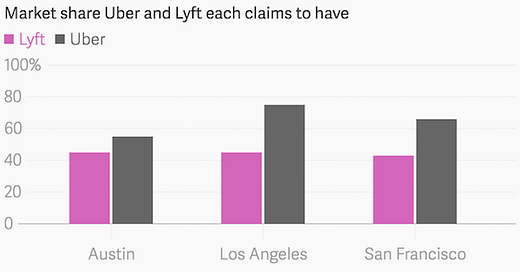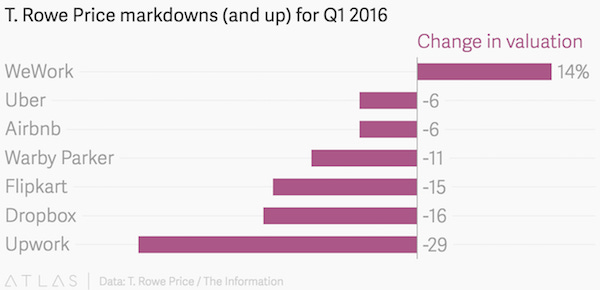“Everything doesn’t have to be pink.”
That is a direct quote from Michael Pelletz, founder of Chariot for Women, the much-hyped “Uber for women.” I recommend you read my entire interview with him, because it is illuminating, and because it contains lines such as “I have the top technology guru in the world basically.” I really am out of things to say about the Chariot for Women phenomenon, so will sum it up like this: Chariot for Women is the manic pixie dream girl of ride-hailing. Its website is fuchsia, its font curly and violet. Its funding is questionable, its business impracticable. It is a sugary-sweet confection selling anti-Uber sentiments, female empowerment, and Pelletz’s desire to be like Richard Gere in Pretty Woman. It is a concept, not a reality. Naturally, the world is obsessed.
Margins and market share.
Funding might be tight for lots of startups, but apparently not for Lyft, which is spending heavily to steal market share from Uber. Lyft raised $1 billion in January and “to keep costs in check … has promised investors to cap its losses at no more than $50 million a month, according to a person familiar with the matter.” This is the first shocking number in Bloomberg’s report, which also works out to $600 million a year. The money is going to big referral bonuses for drivers, trip vouchers for riders, and giant billboards from Las Vegas to Times Square. Lyft says the strategy is working and that it is gaining ridership in big cities. Uber says Lyft is adding only a few percentage points. Their market share claims, you’ll notice, for the most part don’t add up.
The second reveal is for Uber, which Bloomberg says earned an average of $0.19 per ride in the US in February, not including interest, taxes, or equity-based compensation for employees. On the one hand, those are some thin margins! On the other, Uber says it did 50 million trips in the US in March, which according to back-of-the-envelope math would mean it made $9.5 million in the US on trips that month. The numbers probably don’t work out exactly like that, but they look a whole lot better than the aspirational unit economics of most other on-demand startups. And at any rate, it’s some solid evidence that Uber’s low-margin, high-frequency model can actually work.
Startup haircuts.
T. Rowe Price disclosed its first-ever markdowns for Uber and Airbnb on Friday, by 6% each. The mutual fund manager also reported double-digit value cuts to its stakes in at least a dozen private VC-backed companies for the first quarter. WeWork bucked the trend, though T. Rowe still isn’t valuing it at the $16 billion figure that was quoted in the company’s most recent funding round.
Regulatory duels.
“Dueling Rhode Island bills would regulate Uber and Lyft” is the headline on this AP report, and would you believe that the duel is between Uber and taxis? The Uber-friendly bill is in the Rhode Island Senate and notably would define drivers as independent contractors. The taxi-friendly bill is in the House and would require Uber drivers to undergo fingerprinted background checks, as well as limit the company to 100 vehicles (after that, each additional car would cost $150). The House bill would “level the playing field between the cabs, liveries and Uber,” says Rep. John Edwards, its sponsor. The House bill would create "regulatory challenges and obstacles that could have serious impacts" on business, is the unsurprising comment from Cathy Zhou, Uber's general manager for Rhode Island.
Over in Hawaii, legislators are weighing a bill that Uber claims “contains a number of ambiguities that will result in confusion in the marketplace and likely lead to litigation.” In one of its signature petitions, Uber warns that “thousands of flexible income opportunities are on the line,” which is apparently the latest euphemism for gig economy jobs.
And finally in New Jersey, Uber has reached a tentative, $10 million deal with Newark to operate at Newark Liberty International Airport. Previously, Newark mayor Ras Baraka had pledged to ticket and tow ride-hailing vehicles at the airport and at Newark Penn Station, and there was a big scuffle over it. I assume this resolution is only good news for anyone who travels a lot.
Other stuff.
Stacy Brown-Philpot is TaskRabbit’s new CEO. Travis talks to his dad. Instacart adds more booze. Shuddle runs out of money. Rent a luxury hotel, pay by the minute. Also, save money with surge! Lyft-Didi partnership goes live. Uber kills taxis in LA. Uber banned in Buenos Aires. San Francisco trolls Uber. Grocery fight. Hungry now? Funding slows. “It is not like the City Council is totally sovereign in this matter.”
Thanks again for subscribing to Oversharing! If you, in the spirit of the sharing economy, would like to share this newsletter with a friend, you can direct them to sign up here. Send tips, comments, and graphic design inquiries to oversharingstuff@gmail.com.





